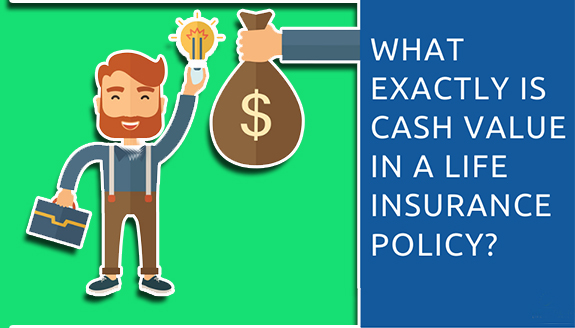A life insurance policy may offer cash value, or interest, in addition to death payouts, which the insured can obtain while they are alive. Cash Value is a type of permanent life insurance that lasts the policyholder’s entire lifetime and includes a cash value savings component. The policyholder may borrow against or utilize the cash value for several purposes, including paying policy premiums.

In comparison with term life insurance, it’s more expensive. Additionally, it does not expire after a predetermined number of years compared to term life insurance. Loans against cash value life insurance policies are available. Furthermore, you can take cash out of the policy, but doing so will lower the death benefit.
How Cash Value Life Insurance Works
Cash value life insurance can offer lasting protection. As long as the payments are covered, beneficiaries receive a death benefit when the insured person passes away. Moreover, cash value life insurance premium payment is made to three different locations:
- To the cash value of the policy.
- At the expense of the insurer paying the death benefit.
- Regarding the costs and expenses of life insurance companies.
The cash value of what you spend is only partially realized. The portion deposited into your cash value account increases with either fixed amounts or gains from investments. Additionally, if you accumulate enough funds in your cash value, you might be able to utilize it to pay for premiums.
If you’re having problems paying the premiums, this option may help you keep the life insurance policy in force. In addition, consult with your insurance agent to discover what regulations apply. Furthermore, one crucial part of cash value is the tax code 7702.
This code is to determine the maximum amount that can be deposited into the policy’s cash value causing it to lose its tax-deferred status. If the sums allocated for cash value surpass certain thresholds, it might be vulnerable to taxation.
Types of Life Insurance that Offers Cash Value
A cash value component is available with whole life, universal life, and variable life insurance plans. Despite being all forms of permanent life insurance, they differ significantly in terms of how cash value increases and how premiums are paid.
For example, whole life insurance has cash-value interest rates and set premiums. Universal life insurance has adjustable interest rates with a floor to guard against great market losses. Moreover, you can allocate your cash value with a variable life policy, and its growth is contingent upon the performance of your assets.
Other types of cash-value life insurance include;
- Guaranteed issue life insurance
- Guaranteed universal life insurance
- Indexed universal life insurance
- Variable universal life insurance
How Much Does Cash Value Insurance Cost
The costs for a cash-value life insurance policy are likely to be higher than 30-year term insurance or mortgage life insurance. However, there are several factors like the type of policy and the death benefit amount, which will determine the exact cost of cash value life insurance. Moreover, the two main variables that will affect your rates are your gender and age.
Your rates will increase with age, and because women often live longer than males, they typically obtain lower rates. Among other things, insurance companies will take into account your lifestyle, profession, medical history, and family medical history.
Advantages of Cash Value Insurance
Death benefit obtained by beneficiaries
As long as you pay the required premiums, cash value life insurance is a perpetual life insurance coverage that will last until your death.
Policies with participating life insurance pay dividends
Multiple whole life insurance plans are “participating”, which means that if the policy is from a mutual insurance policy, you may be eligible to receive life insurance profits. Dividends can be used as cash, to increase the value of your cash, to pay premiums, or to buy “paid-up additions,” which increase the death benefit amount.
Riderscoverage
An accelerated death benefit is one of the known riders on life insurance policies; it is frequently included automatically and at no additional cost. If you have certain medical conditions, you can obtain your death benefit for critical illness, long-term care, and chronic disease, but at an additional fee.
Tax benefits
The growth of your cash value is tax-deferred. In addition, any loans you take out against the policy won’t require you to pay taxes. As with all life insurance payouts, your beneficiaries are entitled to the death benefit tax-free upon your passing.
Disadvantages of cash Value Insurance
Very expensive
Compared to cash-value life insurance, term life insurance is affordable. It will provide you with coverage for your money if you don’t need insurance for the rest of your life and don’t care about accruing cash value.
Building cash value can take time
Certain insurance requires a long time to gain any meaningful market value. You could have to wait many years before you have a significant amount of access.
Beneficiaries do not receive cash value
Upon your death, the life insurance company often receives its cash value back. Your beneficiaries receive the policy’s death benefit amount, less any loans and withdrawals you made from the cash value.
Your coverage may lapse
If you take out loans or withdraw from the policy, you also need to ensure that you keep a minimum amount of cash value; if not, your policy may lapse.
There might be taxes
If you have access to your cash value or end it, you might be subject to taxation on the percentage of the money that comes from interest or investment gains.
How to Use Cash Value Life Insurance
While you are still living, several methods exist to get the cash value portion of your life insurance policy.
Pay premiums
The cash value in your variable and universal life insurance policy may be used to cover your premiums. When you get older and have less money, this can be useful. Moreover, whole life insurance prohibits the use of cash value for premium payments.
Ask your insurer for a loan
Loans against cash value are typically available with interest rates that are lower than those on personal or home equity loans. Consult a counselor about it, as unpaid life insurance loans can minimize the death benefit on your policy or even cause it to stop.
For withdrawal
Your cash value can be withdrawn in the same way as funds from a savings account. The withdrawal amount is not taxed if it is less than the amount of premiums you have paid. However, it may result in a reduction in the value of your death benefit.
If you’re thinking about taking advantage of some of the cash value in your life insurance policy, speak with your insurance agent to learn about it. In addition, also learn how they can impact your policy and benefits.
Conclusion
Cash value life insurance gives policyholders a way to save money for unexpected expenses. Each premium has a part deposited into an interest-bearing savings account, the cash worth of which increases over time tax-free. Furthermore, the insured may use this money for several things during their lifetime.
